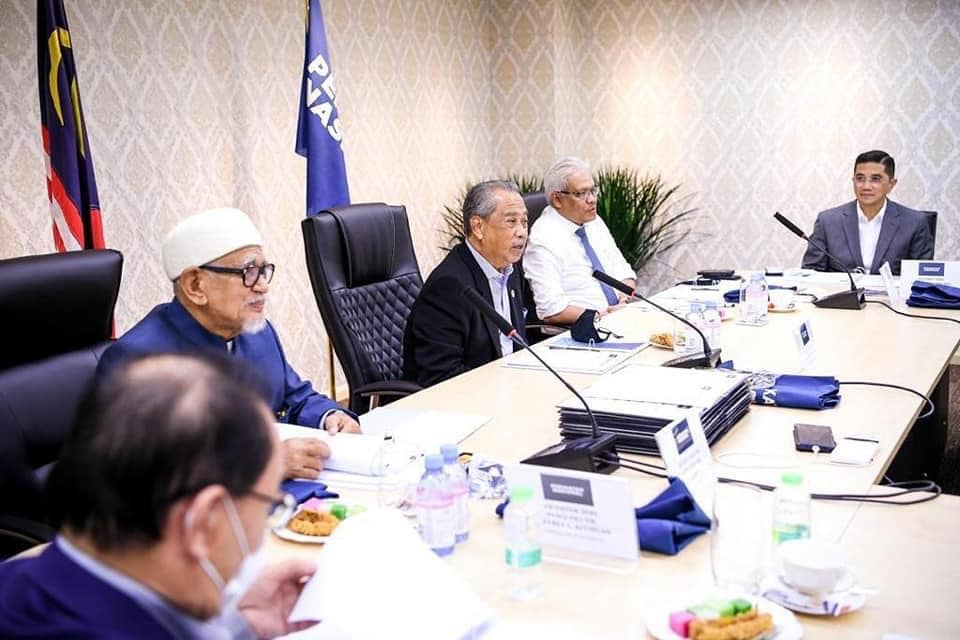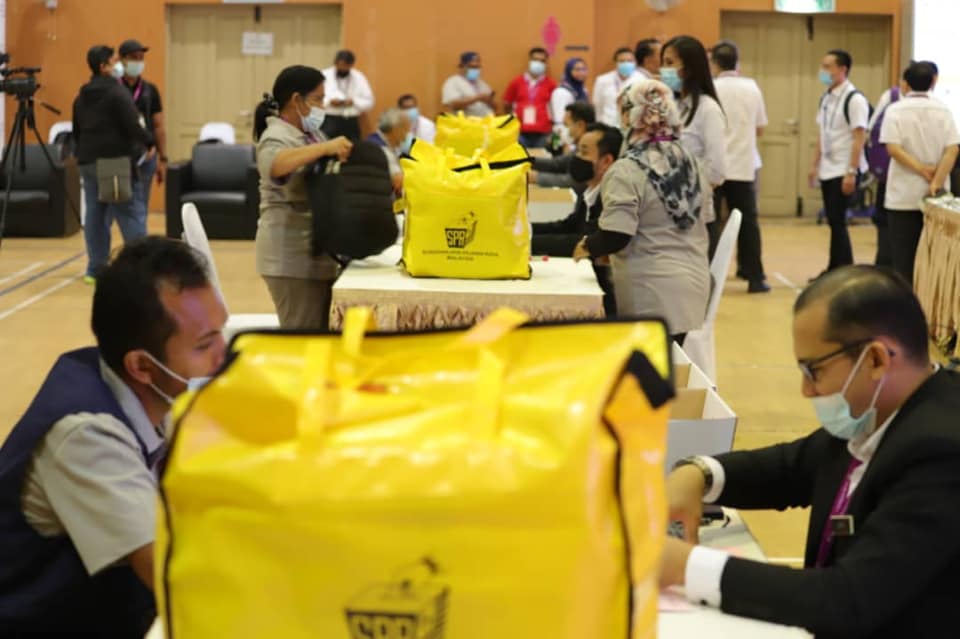
Published in Business Today & Focus Malaysia, image from Business Today.
The passage of Budget 2021 in December and the announcement on the availability in Malaysia of Covid-19 vaccine in February are the antecedents that would create a sense of serendipity at the beginning of 2021 that could herald an easing up of the situation, despite the uncertainty on how fast the current four-digit daily infections can be brought down to a two- or one-digit figure.
Moreover, there is also a sense of inevitability all around the world the deadly virus is here to stay, just like the virus causing the common cold, and some countries are focusing on how to make our coexistence with the virus, if not a symbiotic one, at least a less painful and tragic one.
But there is a consensus: whatever it takes to make this coexistence a new norm, the basic SOPs must be observed at all time in the public domain – observing and internalising the pandemic culture of wearing a face mask, physical distancing and basic hygiene like frequent washing of the hands with sanitiser.
Also, coexistence doesn’t mean the daily infections should be allowed to remain at the current four-digit or worse, five-digit level.
In order to prevent the expectation that vaccine is THE solution from becoming an overhyped mantra, there is a need for the relevant authorities to tamper this expectation by stressing that vaccine is not a cure for Covid-19 but a prevention against contracting the disease, which means a great opportunity for the healthcare and pharmaceutical industry to go big on the research for a cure.
But what’s more important is for the authority from now on, to embark on a strategic planning on how to inoculate the population efficiently and effectively in order to achieve a resounding success in inoculating the public. Any misstep on this would make Malaysia a laughing stock of the world.
This can be done by roping in the best minds the country has in medicine, communicable diseases, logistics, security, media and communications, data scientists, researchers and technologists of the fourth industrial revolution to sit in the high-powered strategic planning committee for the inoculation of Covid-19 amongst the population.
This committee must also adopt a whole of society approach by recruiting social influencers in its subcommittees so that the right communications and instructions can be passed down to the population and the media during the critical time when the inoculation begins.
Instead of being bogged down with the politicking of the politicians on why the vaccine was made available to Malaysia two months after Singapore, which is quite similar to asking why the US or UK got it first before Singapore – an issue never raised by politicians in the republic – a team of experts should be dispatched by this committee to Singapore or any other countries that has already begun inoculating their population with the task of observing and monitoring how inoculation was done in these countries.
From this team, best practices suitable to the Malaysian context can be distilled for implementation when the time comes for Malaysia to inoculate its population.
In short, what needs to be done from now on are:
- Decision to approve the Covid-19 vaccine should not be mired in a maze of bureaucratic red tape but must be done relatively fast, at least before February;
- It is indeed good to hear Pfizer had already submitted a dossier for evaluation to the National Pharmaceutical Regulatory Agency which is under the Drug Control Authority (DCA) of Malaysia. So far, the DCA has not yet approved any Covid-19 vaccine; and
- Good Distribution Practice which refers to the practices in the distribution of the vaccine from the time it leaves the manufacturing site to the point of administering it to the patient/healthy individual, must be in placed at least before February too.
Once everything has been done and get it over with, this committee will leave behind infrastructure that will be very useful should future pandemic occur.
On the economic front, the easing of the situation at the Covid-19 end, will definitely have a speedier impact on the easing of the economy. Already, the Asia Pacific Investment Bank is saying Malaysia’s growth rate is expected to rebound to 6.6% in 2021, following the recovery in the country’s domestic and foreign consumption.
Its CEO, Chris Wang, in a statement on Wednesday (Dec 30) said the forecast hinges on quelling the spread of the Covid-19 virus, political stability and increased demand for the country’s exports.
“Due to rising domestic demand and fuel prices, the national inflation rate is predicted to rise marginally to 1.1%, and there will be an unequal pace of recovery and development in the different domestic sectors,” he added.
It seems more analysts and financial strategists are saying 2021 could bring a change in the narrative, as the Covid-19 world economy wriggles its way out of the early days of 2021 before bouncing back as vaccines and more fiscal stimulus flow into it.
According to experts at Morgan Stanley, even as challenges remain, the global recovery is sustainable, synchronous and supported by policy, following much of the ‘normal’ post-recession playbook.
It predicts an expansion of the world economy at 6.4% in 2021 on a V-shaped recovery, with three key factors that will characterise the next stage of the V-shaped recovery – synchronised global growth, an emerging-market rebound and the return of inflation.
Against this macro outlook, Morgan Stanley strategists urge investors to trust the recovery and overweight equities and credit vis-à-vis government bonds and cash.
The upbeat assessment of many analysts is so logical if we see that the recovery will start from a lower base after Covid-19 has wrought chaos and destruction in the economy. This has happened before with a spectacularly higher growth rate of many countries in 2010 in the wake of the Great Recession of 2009.
There is another different precedent where despite world economies rarely move in unison, there was a synchronous global recovery in which both developed and emerging markets accelerate which has happened a dozen times in the last 40 years with 2017 being the last.
2021 could replicate this movement and the argument goes like this: In the beginning, global GDP growth will likely be propelled by emerging markets. As developed markets emerge from the recent winter lockdowns, they could add up to this rising trajectory. By March or April, all geographies and all sectors of the global economy will be joining the recovery.
This growth will be powered by consumer spending which has nearly returned to pre-pandemic levels. The US is a classic example of this when average personal incomes of US households surpassed pre-pandemic levels in September, even after the first round of fiscal support expired. This suggests a sustainable US recovery, even amid a difficult winter of discontent.
Add this to China recovery which is already on the card, these two developments bode well for the Malaysian economy, as both countries are our major trading partners.
Meanwhile on the political front, politicking will be a bit subdued in the coming months, as every politician worth their salt know that as long as the daily infections are in the 4-digit and the economy is on a recovery trajectory, a snap general election is out of the question.
Hopefully, the interregnum brought about by the pandemic will be used by the politicians for self-reflect to create a political atmosphere where there is less politicking that will lead to a matured and stable political ecosystem in the future.
Efforts towards this have already been made when the Menteri Besar of Johor Datuk Hasni Mohammad considers the opposition PH a “strategic partner”, and walks the talk by tripling the state Budget 2021 allocation for all state legislators including the opposition from RM50,000 to RM200,000. This was later followed by the new MB of Perak Datuk Saarani Mohamad who gave an equal allocation to all state legislators.
At the Federal level, even Prime Minister Tan Sri Muhyiddin Yassin does not discount the possibility of the government cooperating with the opposition bloc in important matters concerning the country, especially regarding the economy and ways to combat Covid-19.
And in his New Year message on Thursday (Dec 31), the Yang di-Pertuan Agong, advised politicians to stop fighting and advancing their agendas, which affect the nation’s stability.
Finally, 2021 will indeed be a good year to ensure the monies approved in Budget 2021 for every ministry will be spent wisely in a transparent and responsible manner via introducing an input-output-impact-outcome metrics to ensure it is the rakyat who will gain immensely from this rakyat-centric Budget 2021.
The current practice that just focus on input-output is inadequate to stop the leak and plunder in government revenue and expenditure. As we bid goodbye to 2020, let’s welcome 2021 and strive to make it a promising year.
Jamari Mohtar is Director of Media & Communications at EMIR Research, an independent think-tank focused on strategic policy recommendations based upon rigorous research.
Diterbitkan oleh Berita Harian & Malaysia Now.
KELULUSAN Belanjawan 2021 dan pengumuman ketersediaan vaksin COVID-19 di Malaysia pada Februari depan satu perkembangan menggembirakan negara, walaupun terdapat ketidakpastian mengenai jangkitan harian empat digit sekarang dapat diturunkan kembali kepada satu atau dua digit.
Realitinya, vaksin bukanlah penyembuh COVID-19. Ia setakat pencegahan jangkitan virus yang memberi peluang besar kepada industri penjagaan kesihatan dan farmaseutikal untuk menjalankan penyelidikan mencari penawarnya.
Namun, apa lebih penting pihak berwajib perlu memulakan perancangan strategik menginokulasi penduduk dengan vaksin COVID-19 secara cekap dan berkesan. Sebarang salah langkah akan menjadikan Malaysia bahan lucu dunia.
Penting untuk mengenal pasti minda terbaik negara dalam pelbagai bidang – perubatan, penyakit berjangkit, logistik, keselamatan, media dan komunikasi, saintis data, penyelidik dan pakar teknologi revolusi industri keempat (IR4.0) – untuk disertakan dalam jawatankuasa perancang strategi peringkat tinggi.
Sekumpulan pakar juga harus dihantar ke Singapura atau negara lain yang sudah mula menginokulasi penduduk mereka bagi tujuan pemerhatian dan pemantauan. Melalui pasukan ini, amalan terbaik yang sesuai dengan konteks Malaysia dapat dilaksanakan apabila tiba masanya.
Ringkasnya, apa perlu dilakukan mulai sekarang adalah keputusan meluluskan vaksin COVID-19 harus dibuat segera, sekurang-kurangnya sebelum Februari.
Satu berita baik apabila Pfizer menyerahkan dokumen untuk dinilai Agensi Pengawalseliaan Farmaseutikal Nasional di bawah Pihak Berkuasa Kawalan Dadah (PBKD) Malaysia. Setakat ini, PBKD belum meluluskan sebarang vaksin COVID-19.
Amalan pengagihan baik bermula vaksin meninggalkan lokasi pembuatan hingga ke titik pemberiannya kepada pesakit atau individu sihat, mesti dirancangkan sekurang-kurangnya sebelum Februari juga.
Harapannya, selepas semuanya selesai, jawatankuasa ini akan meninggalkan infrastruktur yang akan sangat berguna sekiranya berlaku satu lagi pandemik pada masa depan.
Dari segi ekonomi, apabila keadaan menjadi lebih baik di medan COVID-19, ia pastinya mempunyai impak segera yang lebih baik kepada ekonomi negara.
Malah, Bank Pelaburan Asia Pasifik mengatakan kadar pertumbuhan Malaysia dijangka meningkat semula menjadi 6.6 peratus pada 2021 susulan pemulihan penggunaan domestik dan asing negara.
Memetik kata-kata Ketua Pegawai Eksekutifnya, Chris Wang, “Oleh kerana kenaikan permintaan domestik dan harga bahan bakar, kadar inflasi nasional diramalkan meningkat sedikit hingga 1.1 peratus dan akan terdapat tahap pemulihan serta pembangunan yang tidak serata di pelbagai sektor domestik”.
Nampaknya, lebih banyak penganalisis dan ahli strategi kewangan mengatakan 2021 dapat membawa perubahan dalam naratif, ketika ekonomi dunia merangkak keluar dari awal 2021 sebelum bangkit kembali, apabila vaksin dan rangsangan fiskal mengalir ke dalamnya.
Menurut pakar di Morgan Stanley, walaupun cabaran masih ada, pemulihan global akan berlaku secara berterusan, segerak dan disokong dasar seperti mana terjadi pada pasca kemelesetan sebelum ini.
Ia meramalkan pengembangan 6.4 peratus ekonomi dunia pada 2021 berbentuk V, dengan tiga faktor utama yang akan mencirikan tahap pemulihan seterusnya – pertumbuhan global yang diselaraskan, pemulihan pasaran yang baru muncul dan kembalinya inflasi.
Penilaian optimis ramai penganalisis itu sangat logikal jika melihat pemulihan akan bermula daripada dasar lebih rendah selepas COVID-19, mengakibatkan kekacauan dan kehancuran dalam ekonomi.
Pada awalnya, pertumbuhan Keluaran Dalam Negara Kasar (KDNK) global kemungkinan akan dilonjakkan pasaran baharu muncul.
Ketika pasaran maju muncul daripada penguncian kota musim sejuk baru-baru ini, mereka dapat meningkatkan lagi lonjakan ekonomi global. Menjelang Mac atau April, semua geografi dan semua sektor ekonomi global akan bergerak searah dalam pemulihan.
Pertumbuhan ini akan didorong perbelanjaan pengguna yang hampir kembali ke tahap pra-pandemik. Amerika Syarikat (AS) contoh klasik apabila rata-rata pendapatan peribadi isi rumahnya melepasi tahap pra-pandemik pada September, walaupun selepas pusingan pertama sokongan fiskal tamat.
Ini menunjukkan pemulihan AS berterusan. Diambil kira pemulihan China yang sedang berlaku, kedua-dua perkembangan ini petanda baik bagi ekonomi Malaysia, kerana kedua-dua negara adalah rakan dagang utama kita.
Dalam medan politik, iklim politik tidak stabil akan sedikit reda pada bulan mendatang, kerana setiap ahli politik sedar selagi jangkitan harian berada dalam lingkungan empat digit dan ekonomi di landasan pemulihan, pilihan raya mengejut tidak akan diadakan.
Moga jeda peralihan ini digunakan ahli politik untuk merenung diri dalam mewujudkan suasana di mana politik berkurangan akan membawa kepada ekosistem politik matang dan stabil pada masa depan.
Usaha ke arah ini dilakukan ketika Menteri Besar Johor, Datuk Hasni Mohammad, menganggap pembangkang Pakatan Harapan (PH) sebagai ‘rakan strategik’ dan memperuntukkan tiga kali ganda untuk semua Ahli Dewan Undangan Negeri (ADUN), termasuk pembangkang dalam Belanjawan 2021 negeri itu – daripada RM50,000 hingga RM200,000.
Ini diikuti Menteri Besar Perak, Datuk Saarani Mohamad, yang memberikan peruntukan sama kepada semua ADUN.
Bahkan pada peringkat Persekutuan, Perdana Menteri, Tan Sri Muhyiddin Yassin, tidak menolak kemungkinan kerajaan bekerjasama dengan blok pembangkang dalam hal penting mengenai negara, terutama mengenai ekonomi dan cara memerangi COVID-19.
Yang di-Pertuan Agong melalui perutusan tahun baharu juga menasihati ahli politik untuk berhenti bertelagah dan memajukan agenda mereka, yang boleh menjejas kestabilan negara.
Akhir kata, 2021 sememangnya menjadi tahun baik untuk memastikan wang yang diluluskan dalam Belanjawan 2021 untuk setiap kementerian akan dibelanjakan dengan bijak dan telus melalui pengenalan metrik ‘input-output-impak-hasil’ untuk memastikan rakyat yang akan memperoleh manfaat.
Amalan semasa yang hanya memfokuskan input-output tidak memadai untuk menghentikan kebocoran dan penjarahan pendapatan serta perbelanjaan kerajaan.
Semoga 2021 tahun yang menjanjikan harapan cerah untuk semua selepas menjalani liku hidup yang penuh pancaroba pada 2020.
Jamari Mohtar merupakan Pengarah Media & Komunikasi di EMIR Research, sebuah organisasi pemikir bebas yang berfokuskan kepada pencernaan saranan-saranan dasar strategik berteraskan penyelidikan yang terperinci, konsisten dan menyeluruh.

